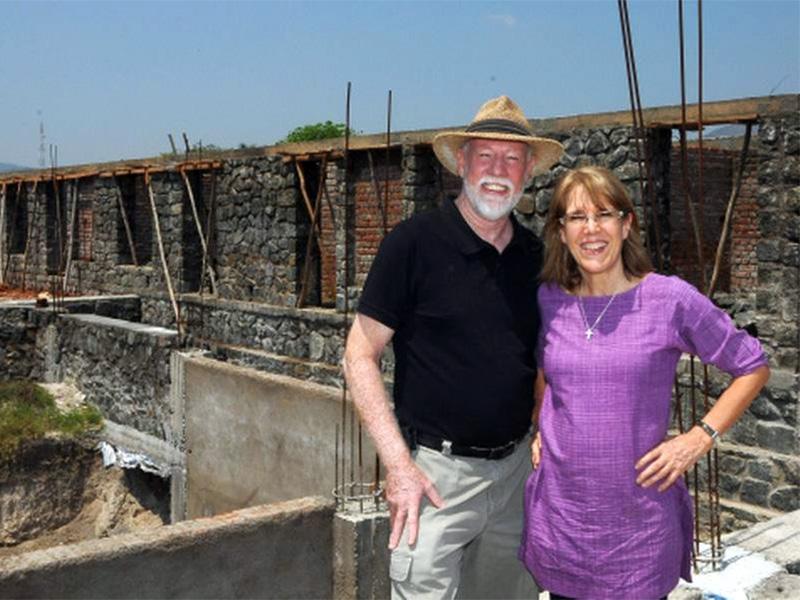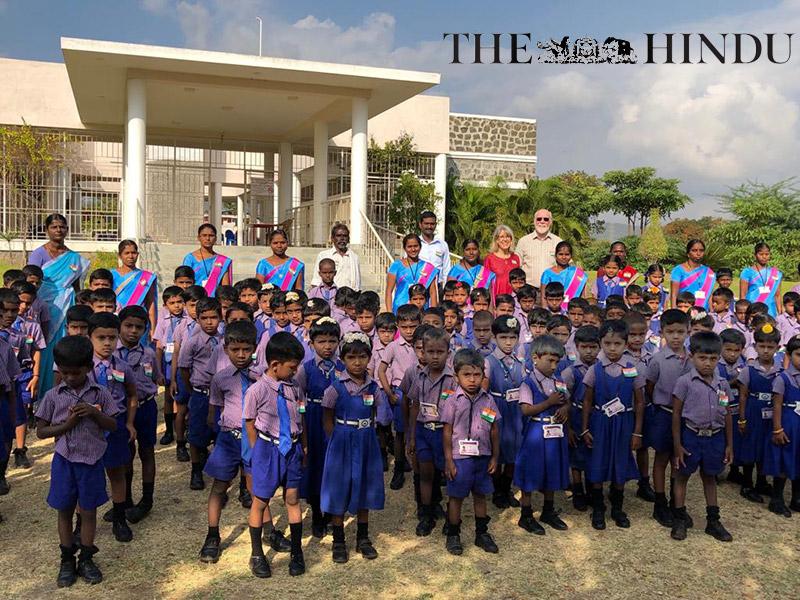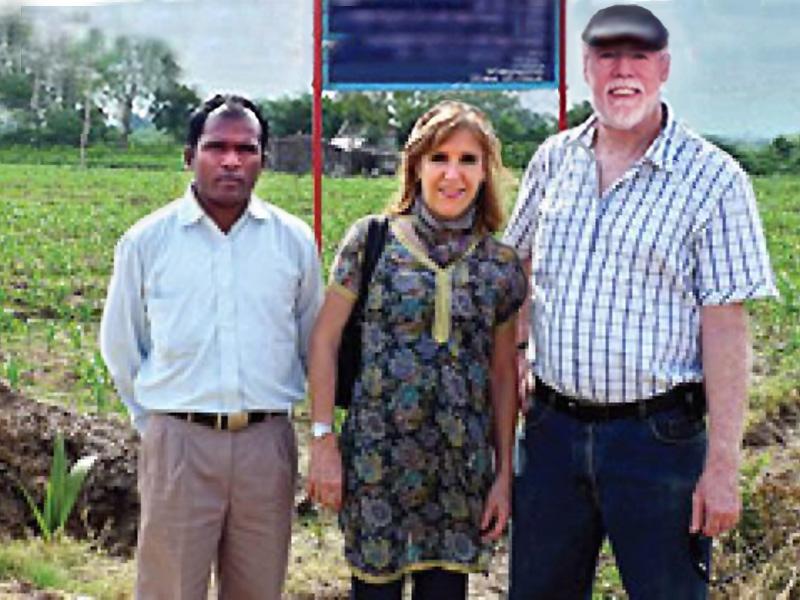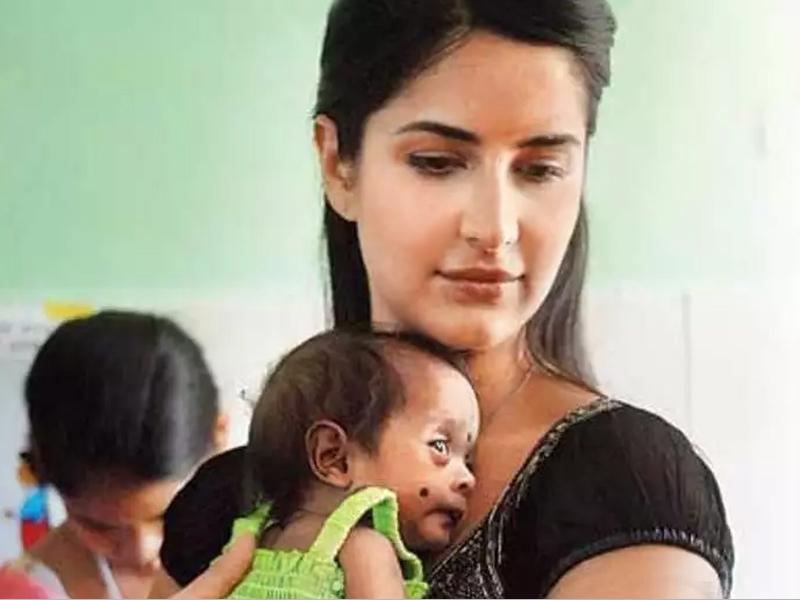a story of love…

THE HINDU METRO PLUS.
Charity workers Susanna and Jesse Joseph put their concern and compassion into action to transform lives of girl children in and around Madurai
They are the unlikeliest of ‘thaathaa-paatis’ but they hardly need an introduction in the mountainous hinterland of Madurai district. ‘Jesse Thaathaa’ and ‘Susanna Paati’ are household names in Pudupatti and a dozen other villages in the Usilampatti taluk. Their enthusiasm for improving the health, well-being and status of girl children is just about legendary in this belt, otherwise notorious for female foeticide and infanticide.
Susanna and Jesse Joseph left London post-tsunami to work with Relief Projects India. They felt the pain of the deprived and felt moved to do even more. People and the culture captivated them and they decided to stay on to bring back a smile on the faces of the impoverished children, so many of them that they met.
The duo sprinted into action for the underserved kids because they believe that the key to making a positive change in the world today is through educating children and empowering the parents to raise their children.“Life is how you make it,” they say.
While working with the Tsunami victims, Susanna and Jesse learnt about the Claretian Mercy Home for abandoned children in Azhagusurai village, 30 kms off Madurai. “We had no choice but to follow the heart’s calling,” says Susanna.
The visit to the Home eight years ago had surprise in store. “There stood a good building but without any facility and basic services,” they recount. An immediate plan was drawn up for the 30-odd babies bringing in common sense and measures based on Western ideas.
“The staff was not even aware that the place could be better”, says Jesse, “and we had the time and ability to change that.”
The couple networked with their friends involved in charity in the U.K and help poured in. As the toddlers were getting boils due to heat and frequent power cuts, a generator was procured. The rooms were tiled and air-conditioned. Washing machines and baby-warmers were bought and diapers and nappie covers imported. It changed the face of the place.
But during their stay what baffled Susanna was the “boy-child preference’ in India. As a mother of seven daughters – one of them being Bollywood actor Katrina Kaif – she realised just rescuing female babies from the throes of death does not help. “The entire community’s perception has to change, you can not simply isolate the girl child,” she asserts.
What further disturbed Susanna was Indian couples’ lack of interest in adopting a physically challenged baby. So she set up a pre-school exclusively for the special children called “Little Darlings”. “Rewards are inbuilt for us,” she smiles, “these adopted kids when they meet us now are well dressed, have beautiful parents, speak good English.”
“Living in a world with humanitarian needs, says Jesse, “most rewarding is to make a positive difference in somebody’s life.” “When we talk about change, it means hope,” both echo.
When the cradle system got going good, they decided to move into the interiors to dispel the conceived ideas of gender preference. The sharp decline in female and male child sex ratio from 947/1000 in 1981 to 917/1000 in 2011 rattled them.
“These are not just numbers, these are real people,” says Susanna. “And it was not just in Usilampatti but goes up to Erode, Salem…We wanted our jobs to mean something and contribute to society in a positive way, no matter how small that might be.”
How to elevate the respect for female babies in whatever way it takes – the thought nagged them. The couple realised if they had to improve the life of the poor children in the villages, especially the girl children, they would have to provide quality care.
The demand came from the community. “It is best to be open-minded and let the area tell us what it wants and how to proceed,” points out Jesse.
The locals wanted an after-school programme so that the kids have a place to go and learn good English, etiquettes and refine their knowledge. Jesse and Susanna saw an opportunity. They understood that if they could provide it, there would be no distrust. People would believe in their cause and join in the movement.
“If more people get involved to build awareness, it will make a dramatic change in society. It is a self-perpetuated machine, once you get the ball rolling, it rolls,” says Jesse. “The change will continue to occur through a pattern that will correct itself,” Susanna adds.
Two years ago they started tuition centres in five villages with 50 to 70 children each who get free notebooks and stationery, learn through video classes and are rewarded for full attendance. The study centres powered by portable rechargeable lights is a zone of buzz in the evenings as children are beginning to show marked improvement in their school grades.
The “Services, Health and Education” (SHE) project was launched simultaneously with special focus on female and physically handicapped children. The couple is expecting to complete the construction of a new eco-friendly building by this summer which will integrate multiple activities under one roof. It will have a pre-school where emphasis would be on teaching English, it will have classrooms and reading rooms, youth and health club, library and play zone. Their idea is to involve boys, girls and youths from the neighbouring villages in meaningful study and activities.
“We are not chasing glory but are here for the impact. We want to educate and empower orphans and indigent children and up their living,” says Susanna. “We have few concrete goals and lot of add-on goals. But finally when we are gone, it should continue to serve the people and the purpose,” says Jesse. Their long standing aim is to bring these villages towards self-sufficiency by combating social issues like bonded labour, health issues such as anaemia, infant and maternal mortality rates and improving the economic status of villagers.
Susanna and Jesse’s passion and idealism are drawing good people to them and they are getting the volunteers they needed.
“It is a ripple effect. Even if you can’t give anything else, what you certainly can is your time for a cause,” she says, even as she takes time out for her hobby – acrylic painting.
“We can and we must do more,” he says, also into biking and growing plants with equal enthusiasm.
Soma Basu





